Now Offering HeartFlow® FFRCT Analysis, a Non-Invasive Diagnostic Tool for Coronary Artery Disease

Lakewood Ranch Medical Center and Manatee Memorial Hospital, members of the Manatee Healthcare System, are the first hospitals in Manatee and Sarasota Counties to offer cardiac patients the HeartFlow® Analysis, a first-of-its-kind, non-invasive, diagnostic technology that aids physicians in the diagnoses of coronary artery disease (CAD), the most common form of heart disease.
CAD is the leading cause of death for both men and women in the United States.1 CAD develops when the arteries leading to the heart narrow or become blocked, which may lead to a reduction in blood flow to the heart, causing chest pain, heart attacks and death. Despite being the most common form of heart disease, studies have shown there is a need to improve how CAD is evaluated and diagnosed. Many of the non-invasive tests available today have low accuracy rates in detecting CAD. Additionally, a recent study found more than half of patients with suspected CAD who underwent an invasive coronary angiogram (ICA) had no need for intervention, since no blood flow-limiting blockage was found during the procedure.2
The HeartFlow Analysis shows how each blockage impacts blood flow to a patient’s heart. Using a CT scan, the HeartFlow Analysis creates a computerized 3D model of a patient’s coronary arteries. With trained specialists and powerful computers, the HeartFlow Analysis simulates blood flow and assesses the impact of blockages on blood flow to the heart. Physicians receive a digital, color-coded, 3D model of the patient's coronary arteries that is available on web and mobile.
Three cardiologist on staff at both hospitals have been trained by HeartFlow. They are David C. Buck, DO, FACC, Eugene M. Parent, MD, FACC and Bruce R. Lipskind, MD, FACC, all from Bradenton Cardiology Center/Manatee Physician Alliance.
"Historically, we have been faced with either using tests that were frequently inaccurate or putting a patient through an invasive procedure to determine whether they would need another invasive procedure to restore blood flow," said Dr. Buck. "The HeartFlow Analysis completely changes this paradigm, providing essential information that can help us determine the best approach for a patient through a convenient, non-invasive platform."
The HeartFlow Analysis has been used with over 75,000 patients with suspected heart disease. Additionally, in clinical trials, using the HeartFlow Analysis helped identify which patients do and do not need invasive treatment.3 The use of the HeartFlow Analysis also reduced the cost of care by 26 percent compared to usual care.4
For additional information on this news release, please contact:
Kristina Sparacino, Director of Marketing at Lakewood Ranch Medical Center
kristina.sparacino@lwrmc.com
352-427-2108
Betty Chambliss, Director of Marketing and Communications at Manatee Memorial Hospital
betty.chambliss@mmhhs.com
941-745-7545
1 American Heart Association
2 Patel, et al., Am Heart J 2014; 167:846-852.e2
3 Douglas, et al., Euro Heart J 2015
4 Douglas, et al. J Am Coll Cardiol 2016; 68:435-45
